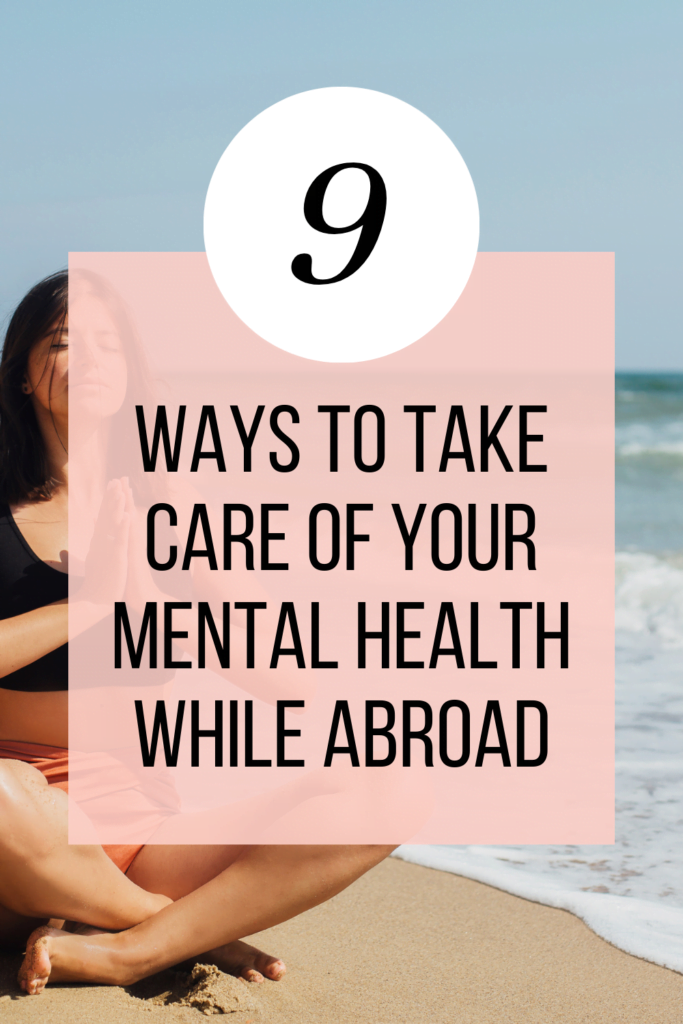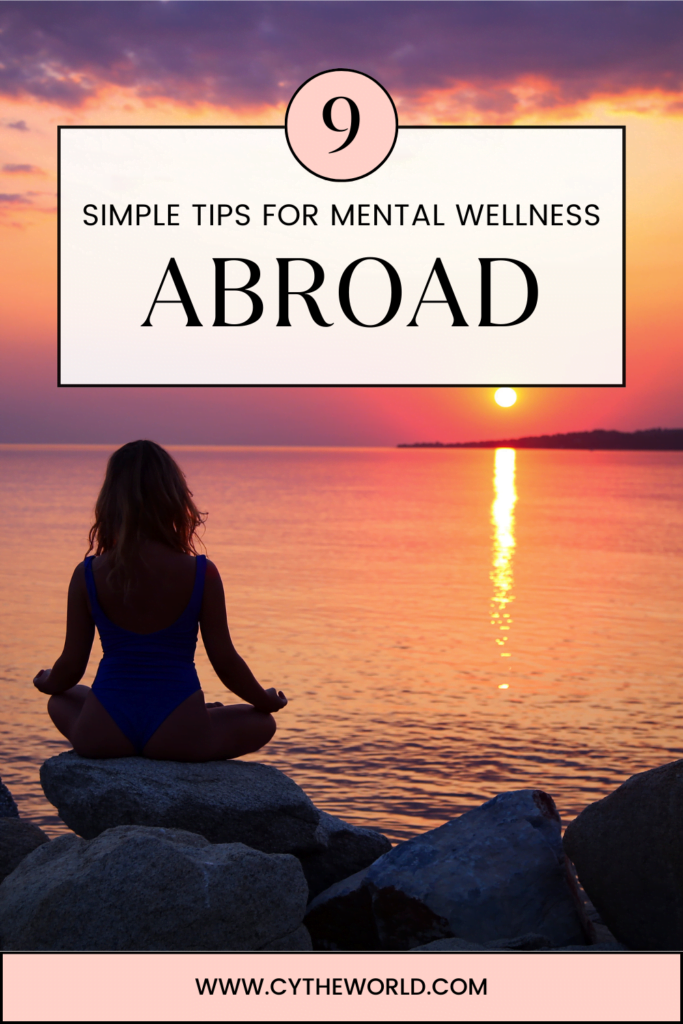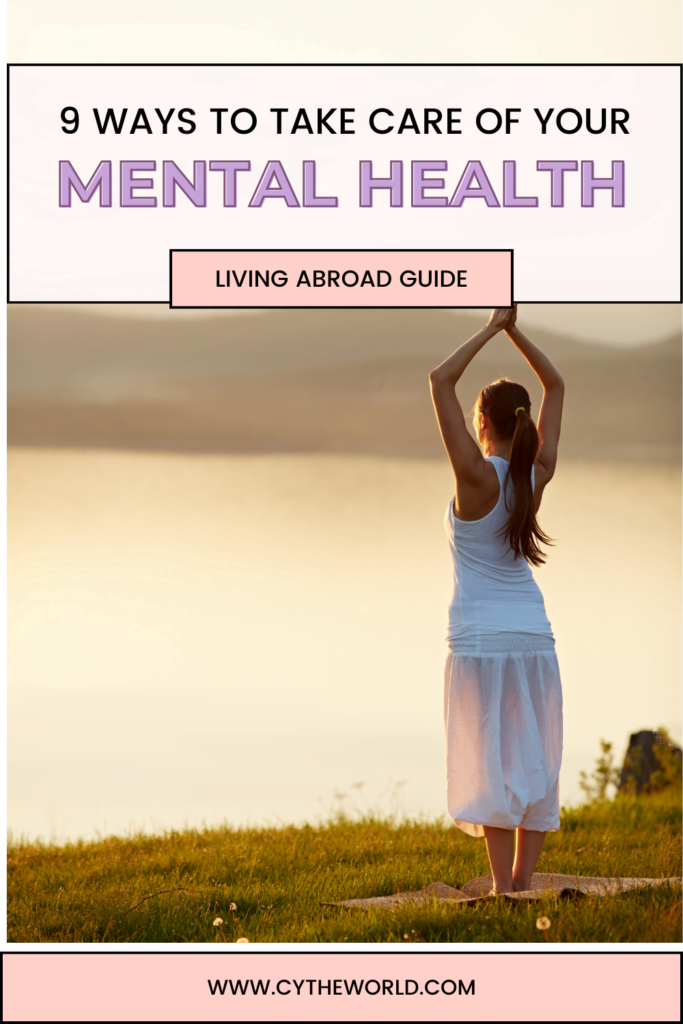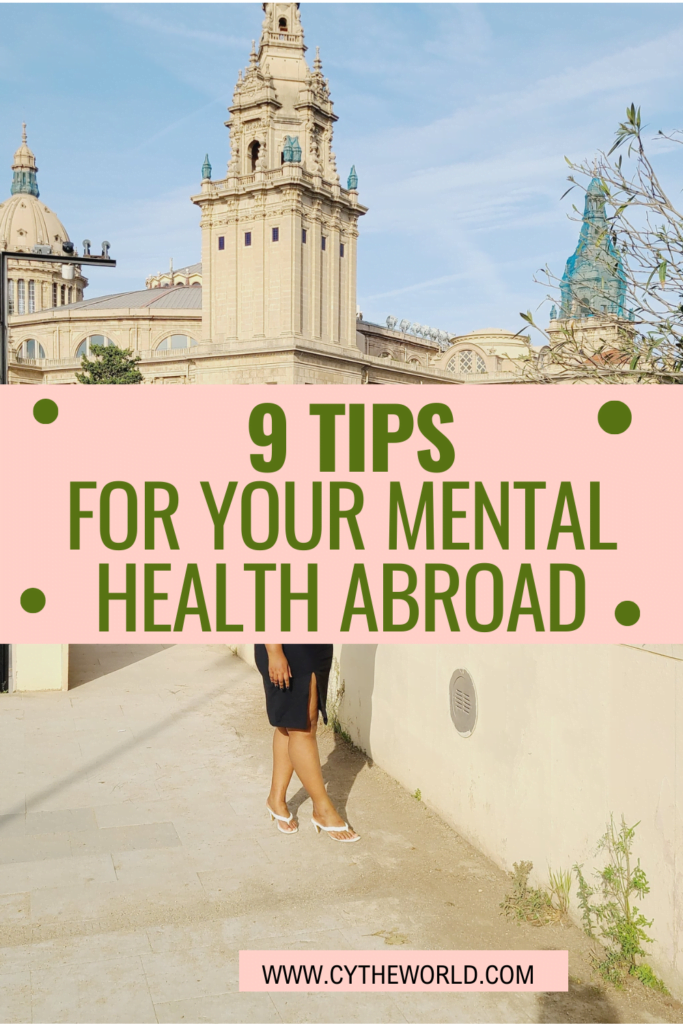We have become more open about discussing mental health and wellness as a society. Young people especially have become the driving force in the discussion about how to care for our wellness. We see great people like Simon Biles taking a break from competing at the 2020 Olympics because of their mental health, demonstrating that not everything that is shining is gold. You cannot accomplish greatness without your mental well-being, even when traveling.
Traveling is a fantastic experience. You learn so much about yourself, and traveling allows you to grow in every facet of your life. However, when you live abroad, you will face a lot of change. These changes require you to care for yourself physically and mentally. Taking care of your mental health allows you to live abroad without suffering. This post advises you on steps to care for yourself, ensuring you have a support system at home and in your host cities. These steps will enable you to prioritize your mental wellness and mitigate the uncertainty of living abroad. Here are the nine ways to manage your mental health while abroad.

Ways to care for your mental Health Abroad:
- Adjust your mentality
Adjusting your mentality is the primary rule for caring for your mental health abroad. Avoid comparing your hometown to the city that you are visiting. When you first move to a new city, you will notice the differences and similarities between your host city and your hometown. It was inevitable that Shanghai was different than Providence. I thought Shanghai resembled New York City at first sight, and when I started exploring the various neighborhoods, I noticed the differences and things I deemed similar to other places I have been to. It is expected to compare and see differences. However, it is unhealthy to keep the mentality of your hometown instead of adjusting it to your new environment.
For example, when I moved to Rennes and went grocery shopping, I had to stop comparing prices between how much it cost in Rennes and what it cost in Providence. Although it was inevitable to make a price comparison, I had to realize that I was using a different currency. By understanding that I was in a different country and using a different currency, I needed to stop thinking I was paying more in euros than in dollars because, in reality, the Euro is higher than the dollar. Therefore, I was not making a fair comparison by constantly analyzing, comparing, and doing a currency exchange to see how much I was spending.

- Stay Connected
The second way to care for your mental health abroad is by staying connected to your communities. Connections and our communities are very crucial to our mental wellness. Some people think that when they go abroad, the physical separation from their communities means they are all alone. On the contrary, physical separation does not mean you are alone, even when you are abroad. In the first weeks, when you have met new acquaintances in your new cities, it is vital to stay connected. Stay connected with your family and friends through social media apps like WhatsApp, Instagram, Facebook, or Zoom. By staying connected, you ensure you are surrounded by those who love you in times of change and uncertainty. Staying connected allows you to have the support of those who love you as you navigate the uncertainty of living abroad. Your community encourages you and is your daily therapist while you try to build a new community.
When I lived abroad, my mother and I talked every day. It was a way to maintain a sense of normalcy in my new, unfamiliar experience. I would take her with me on every exploration, allowing her to experience and see what I saw. Staying connected to an aspect of home enabled me to create a new home with confidence because I was starting the journey without feeling alone, which helped my mental health immensely. However, my mother was not the only person I stayed connected to when I was abroad. I stayed connected with professors and sought their advice about networking and navigating different academic settings since my extended European stays were for educational purposes. I spoke to them when I had trouble with curriculum and methodologies because they understood the ropes I was trying to jump. As an American student with an amicable and approachable relationship with my professors, I found navigating the French and Belgian hierarchic mentality challenging. Professors did not have office hours where I could ask questions or tell them about my struggles. Therefore, staying connected with my professors at my alma mater helped me navigate what I was supposed to do academically.

- Connect with neighbors
They say your first source of networking is those around you. Your neighbors are your first opportunity to create a new community, especially when you study abroad and live in a student residence. Living among international students looking to connect with others like you is feasible, allowing you to make new acquaintances and build your new community.
I had a fantastic time in France because of my neighbors. On arrival, I made my first acquaintance as I struggled to have my suitcases upstairs. A Brazilian master’s student held the door for me and introduced himself. A couple of hours later, when I felt ill and could not move, I heard footsteps and called for help, and the same neighbor was the one to help me. Until today, he and I have been friends; because of him, I will have a place to stay when I go to Brazil.
When you move to a new place, your neighbors are usually your first point of contact. Getting to know them ensures your safety because you know who surrounds you and also allows you to build a new community. The importance of this community is the insurance that you are not alone. You have physical people who will help you navigate your new normalcy. These people become your emergency contact in case of an incident. They become your trusted advisors and people you feel close to share what is bothering you.

While in Rennes, my neighbors were local students and international students. Because we shared a kitchen, the kitchen became the detox place for everyone. The kitchen was where we met, cooked together, told stories, and shared meals worldwide. Every night became a social gathering. When one person was not in the kitchen, we had to look for them because we felt responsible for one another. When there was a quarrel, other students became mediators because we knew the kitchen was the meeting spot, and we were all dealing with a lot. We wanted to come home to relax and mingle so we couldn’t have any bad blood. Having this solidarity made coming home easy and made the homemaking process easier.
On the contrary, when I lived in Belgium, I suffered the most significant depression because, in my first apartment, I did not have neighbors. I had no community to come home to and relate my trials and tribulations. When you add the context of living abroad during the pandemic, you can understand how not having a physical community impacted my mental health. When I moved to a student residence and met other students from different universities, I regained my confidence because I now had a community I could come home to. Therefore, next time you are abroad, you may wonder how to build a community with those closest to you– the neighbors.
- Go on solo mini-trips
As a solo traveler, solo traveling has been one of the best tools to care for my mental health when abroad. While living in France, I enjoyed taking mini-trips throughout different regions and cities. Going on mini-trips is exciting. It is a way to detach from your new home and seek a different thrill, mainly when you are accustomed to your host city. By taking mini-trips, you constantly add to the excitement of being in a new environment when your host city becomes mundane. Mini-trips allow you to practice self-care and prevent you from boredom, which may impact your well-being.
When I lived in Rennes, I spent most of my weekends traveling outside Rennes. I went to Normandy, other Britanny cities like Brest, Nantes, and my favorite, Saint-Malo, to breathe different air, see various aspects of French culture, and indulge in different activities. Your mini-trips do not have to be grand, however. When I went to nearby cities, they were only day trips. I left in the morning and came back at night. So next time you are bored or wondering how to revamp your excitement when living abroad, take several mini-trips.

- Keep the activities you usually enjoy
One of the ways I kept sane when I lived abroad was by maintaining the activities I usually enjoy. Living abroad is an experience where everything is new. Being surrounded by newness and trying to understand the unknown can be overwhelming and take a toll on your mental health. Some people feel they must change everything about themselves and conform to the newness to integrate. However, that mindset takes a toll on them because they are trying to assimilate instead of integrate.
Assimilation often calls you to get rid of yourself and transform into whatever you think is acceptable by the society you now have to call home. I have seen travelers try to assimilate by changing their accents, embodying local mindsets, especially when those mindsets disfavored their country of origin, and hiding their cultures because they would become targets. You are doing all that took a toll on their mental health. Integration, however, acknowledges who you are and what you like and mixes it with things you’d like to incorporate from your new location. Therefore, keeping the things you enjoy back home is crucial because they are part of your identity and make you happy. Doing what you like or love is a way to bring “home” wherever you go. It allows you to keep things that matter to you and have something to add when introducing others.
- Cook
I have touted the benefits of cooking on this website on various occasions. I listed cooking as an excellent way to save money and be financially conscious and as a perfect activity to do when living alone. Cooking has many benefits, and all of them promote mental wellness. Cooking is a great stress reliever. After a long day of navigating different settings and figuring things out, cooking can help you calm down and focus on what you are doing. As an art, it allows you to express yourself and your taste by trying different recipes and flavors. It will enable you to feed yourself with nutritious meals as a survival tool. Cooking is a love language and is not something we only do out of necessity.
I found my joy in cooking when I lived abroad. Looking up different recipes on Pinterest and calling home to my mother to ask her about her recipes were some of my most cherished memories. I would also ask locals about their famous dishes and individual recipes so that I can try them when I am at home. Whether cooking with others, for others, or myself, cooking provided me an unmatched joy. That is why I try to include it as one activity I’d like to do when I travel to different places. I would love to take a cooking class in Paris and Florence next time I visit Europe.

- Join social clubs & try new things.
Another way to care for your mental health while living abroad is to join social clubs. Social clubs are a great integration tool when you move to a new city or go abroad. They are gathering places where you can mingle with locals and other people in your situation. Big cities offer many social club opportunities. One of the reasons many people travel is to have different experiences. They want to see other things and get out of their comfort zone. Traveling gets you out of your comfort zone, so you inevitably want to try new things. Therefore, go out! Do things you usually wouldn’t do. Join clubs, go on organized excursions, or even start a club. This will help you build a social life and a routine, which is good for your mental health.
When I lived in Belgium, we were in the middle of the pandemic, and everything was close. In-person activities I was looking forward to, like making your chocolate at Godiva, were canceled. Therefore, I had to seek online social clubs on Facebook, where my alma mater posted online get-togethers. Because most students were in different places, social activities included sharing our daily experiences of being foreigners away from our families during a global pandemic. These social gatherings helped me not feel alone and helped me understand I was not alone in this predicament. When the government loosened some restrictions, I joined clubs that organized different excursions, allowing me to discover various cities and other people who were itching to get out of their studios like me.
- Go on dates
Dating is another way to care for your mental health when abroad. Research shows that young people don’t go out. Because of social media, they are not social and need more social skills. More young people are indoors looking at their screens, affecting their connections and invoking social anxieties. Dating is part of growing up and understanding what we like and don’t like. Dating is a life exercise that allows us to discover who we are and who we want to surround ourselves with, and it helps us build trust with strangers. Dating abroad is the perfect setting to explore the dating scene.
I first enjoyed dating abroad because I got to present who I am without worrying about who’s watching and who’s judging. I explored different “types” without restraint, letting me know who suits me and who I am compatible with. Dating without restraints also relaxed me and removed the stress of “being liked.” Sometimes, when I date, I anticipate an outcome and plan how to behave to realize a specific outcome, but I feel disenguined about the whole process. When I dated abroad, I did not care about the outcome. Knowing that if it were a bad date, I would not have to face the person or worry about them badmouthing me allowed me to enjoy the ride without worrying about the outcome. I had several bad dates in France, but because I was abroad, they did not leave a scar, and they are just funny memories to me that I laugh with my friends about.

The second reason travelers enjoy dating abroad is because of the spontaneity that it evokes. You go with the flow because you are not too pressed to look perfect, be perfect, or whatnot. You learn to live in the moment and take the day a minute at a time. Imagine being asked for a coffee date, and after the coffee date, you decide to take a walk together, talking, not realizing you are how much time has passed. You stroll around beautiful moments, small paved roads, and bridges only to end up at the Champs Elysee in Paris or Place Royale in Brussels. You learn about yourself through dates and explore the city with a trusted guide if you are on a date with a local. Suppose you are on a date with another international student. In that case, you both are exploring your new cities together and learning from each other, displaying your strengths and weaknesses, enabling you to learn about each other on a deeper level.
Having experienced the thrill of dating abroad positively impacted my mental health while living abroad. Having someone to talk to without being judged or liked for who you are without restraints is fantastic. Because of my experience abroad, when I moved back to the U.S., I learned to present myself on dates without worrying about what the person would think of me if I did A instead of B. I learned to put my interests and needs first because I had plenty of experience abroad.
- Own your space
The last advice for any traveler visiting, living abroad, or studying abroad is to take care of your mental health; you’ll need to own your space. Owning your space can mean many things that look different in various contexts. I define owning your space as understanding that this is your life. The house, the neighborhood, the city, the country, and the experience itself are yours to own. Whatever space, whether physical or mental, is yours to call home. After living in France for a few weeks, I learned this when I realized I would live in Rennes for an entire year. Rennes was my hometown when I was in France. When I go to other French cities and people ask me where I live, I’d say Rennes. When Parisians would make haughty remarks against “la province,” I felt compelled to stand up for Rennes because I owned that city. It was the city where I spent my daily life. It was where my community of international friends were. It was where my apartment was, where I laid my head and felt at home. Rennes was my reference while living in Rennes, and Ghent was my Belgian reference when I lived in Belgium.
Owning the space should not just be when you live abroad for a long time. Owning the space should be a way of life and considered in everything you do. When you own a space, you shift your mentality from viewing something as foreign and accepting it as belonging to you. That principle applies anywhere. When you stay at a hotel, you start owning the space by jumping on the bed, putting out your things, and organizing the way you want so that you feel like you are coming home every time you enter the room.
Some people think owning the space is feasible if you are abroad for a long time. Some travelers who travel for a short duration believe they cannot or should not because they are only there briefly. Therefore, they spend their day trying to cramp up as many activities as possible because they are racing against time. I saw this with students studying abroad for only one semester. Having a rushed experience deprived them of enjoying what they were experiencing. They did not have the time to have a meaningful connection to the place they were staying. They became more focused on checking off their attraction goals than they had time to live the moments they were experiencing, which puts a damp on your mental health.

When you are too busy worrying about whether or not you checked off your attraction goals and don’t give yourself the time to indulge in your experiences, it affects your mental health. Your brain does not get to enjoy, analyze, or realize that you are walking the halls of the Versailles because you are already thinking about when to make it to the following attractions. As a traveler who goes abroad to relax, indulge, and experience beautiful adventures, you become a shopper rushing to get their errands done before the store closes because your experience becomes a job. For that reason, many students return without meaningful experiences and realize that they did not enjoy seeing the Eiffel Tower through their own eyes but the lens of the camera they were holding while at the Eiffel Tower.
The other reason why not owning the space affects your mental health abroad is because you remain a foreigner to that city, country, or experience, meaning you did not integrate into the daily lives of the place you lived or visited. When people ask about your experience, you list things you saw but lack cultural integration to teach those who have never been to that country. For that reason, I hear people talk about their regrets about traveling and wanting to return to a specific city to redo their experience because they did not own whatever space they were in. The last thing any traveler should want to feel is that their decision to go abroad to have an impactful experience was worthless.

In conclusion, you must be proactive in protecting and caring for your mental health abroad. By changing your mindset and owning your space, you train your mind to integrate and practice belonging. By enjoying things you usually do at home and staying connected with your family, you ensure a sense of normalcy and understand that you already have people ready to support and be there for you. Through connecting with your neighbors and joining social clubs, you build new relationships and forge new communities. When you date, you give yourself a chance to end up with Mr. Right, learn about yourself, and grow into yourself. Next time you plan to live abroad, whether for studies, internships, or making a big move, remember these nine ways to care for your mental health.
Until next time, have a great week!
Xoxo,
Cy!
Leave a Reply
You must be logged in to post a comment.